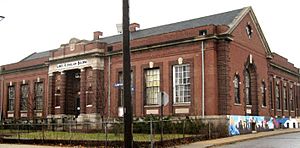The African American Museum in Cleveland facts for kids
The African American Museum in Cleveland, Ohio, is a special place that teaches people about the amazing history and culture of African Americans. It was started in 1953 by a man named Icabod Flewellen. The museum helps young people learn about the many good things black people have added to cultures all over the world. It also works to correct wrong ideas about black people.
The museum is located in an old building that used to be a library. It helps everyone understand the important achievements of African Americans.
Contents
The Museum's Story
The African American Museum in Cleveland was founded by Icabod Flewellen in 1953. It was the very first independent museum in America focused on African American history.
Icabod Flewellen lived in East Cleveland for a long time. He was known for having a huge collection of historical items about African Americans. When he was just 13 years old, Icabod started collecting newspaper clippings about black American history. He was inspired by a writer named J. A. Rogers.
Sadly, Icabod's first collection was destroyed in a fire at his home in West Virginia after he returned from the military. But he didn't give up! He moved to Cleveland, Ohio in 1949 and started collecting materials all over again.
In 1953, he opened his second museum, which was first called the Afro-American Historical and Cultural Society. Much of his collection came from talking to neighbors and learning about their family histories. Some items from Cleveland's "Parade of Progress" in 1964 are still in the museum today.
What the Museum Does
The African American Museum, which opened in April 1953, is located at 1765 Crawford Road in Cleveland. It is a non-profit museum, meaning it's not run for money. Its main goal is to share the achievements of African Americans.
Icabod Flewellen believed that everyone should have the chance to see the accomplishments of people from Africa and those of African descent. At first, his collection was kept at his home. Then, in 1968, it moved to a classroom at St. Marian’s School.
By May 1973, the collection had grown to more than 200,000 items! It moved again to 1839 E. 81st Street. In 1983, the Cleveland Public Library (CPL) let the museum use its Treasure House building on Crawford Road. The museum took over managing the building in 1984. In 1987, the museum building was renamed the Icabod Flewellen building in his honor.
How the Museum Was Supported
Icabod Flewellen worked other jobs to help pay for the museum. As more people became interested in black history, the museum started getting grants for special projects. For example, in 1970, it received $10,000 from the Cleveland Foundation to help organize its collection.
Other groups like the Ohio Humanities Council and the National Endowment for the Humanities also helped. In 1983, the museum got $50,000 to give talks to schoolchildren and community groups. In 1992, the Cleveland and Gund Foundations also provided grants.
Museum Status Today
The museum has been closed since 2005 because the building needed repairs and there wasn't enough money. As of 2010, it has been open only on certain days. The museum is working to raise money so it can fully reopen. Its main goal remains the same: to keep, share, and teach the public about the important contributions African Americans have made to the world.
For many years, the museum has given the Cleveland community a place to learn about black history and celebrate African American culture.
Museum Exhibits
The museum has featured several interesting exhibits:
- African Past and Present
- Civil Movements in America
- Reflections of Black Life in Cleveland
- Black Scientists and Inventors (This exhibit received support from NASA.)
- The African Solar Village Outreach Project
The museum also worked with Green Energy Ohio to host an exhibit about using solar power in African villages. A solar panel was even installed on the museum's roof. The parts of the solar system are shown in a clear display case as part of the exhibit.
The African Solar Village Outreach Project aims to find creative ways to teach science and math, especially about solar energy, to visitors. This exhibit, along with other tours and hands-on activities, helps people understand how science and culture are connected in unique ways.
See also
 | Jackie Robinson |
 | Jack Johnson |
 | Althea Gibson |
 | Arthur Ashe |
 | Muhammad Ali |


